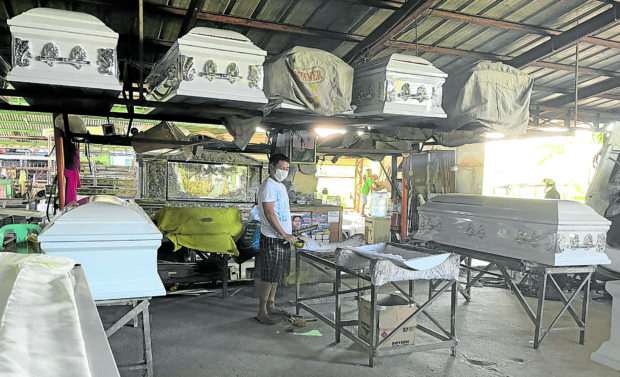
DEMAND UP Stocks at Dhansky Metal Caskets are few because COVID-19 deaths increased
the demand for coffins made in Sto. Tomas that the Department of Trade and Industry dubbed
the casket capital of the Philippines.
MANILA, Philippines — For the commemoration of All Saints Day and All Souls Day, President Rodrigo Duterte urged Filipinos to pray for those whose lives were taken by COVID-19, and those who have made sacrifices to save others.
In a message on Monday, Duterte encouraged the public to “pray for each other” especially during the COVID-19 pandemic.
“We pray for those who have died because of COVID-19 and we also pray for those who have sacrificed life and limb to save more lives and keep safe,” he said.
He described the “Undas,” which he said is a tradition of honoring and remembering departed people, as a “strong pillar of our faith and identity as a people.”
“This occasion offers us a time to reflect and be grateful for the gift of life and the promise of eternity. With the grace of the Almighty, I have full trust that we will be brave these trying times and emerge as a stronger nation,” the President said.
As of October 31, the current death toll in the country since the start of the pandemic last year has reached 43,172, with the addition of 128 new patients who succumbed to COVID-19 complications on Sunday.
The total deaths account for 1.55 percent of the 2,787,276 confirmed infections of the virus in the country. It also make up 0.86 percent of the total deaths worldwide.
Meanwhile, the Department of Health reported 3,410 new cases of COVID-19 also on Sunday, which brings the total confirmed infections in the country to 2,787,276. This is currently the second lowest daily number of cases reported since June, accounting for only 7.2 percent of the relatively low number of individuals tested at 46,450.
Under Proclamation No. 1107, which he signed earlier this year, Duterte changed the All Souls Day (Nov. 2), among other holidays, into a special working day from its previous special non-working day status.
This move is to help “recover from the adverse economic impact of the COVID-19 pandemic” by encouraging economic productivity and “minimizing work disruption and commemorating some special holidays as special working days instead.”
The distinction between the special working holiday and special non-working holiday is the rate of pay an employee will get should he or she decide to work on that specific day.
Based on the holiday pay rules issued by the Department of Labor and Employment, if an employee did not go to work on a special non-working holiday, the “no work, no pay” principle shall apply (unless there is a company policy granting payment on a special day). For work done, he shall be paid an additional 30 percent of his basic wage on the first eight hours of work.
For work performed on a special working holiday, an employee is entitled only to his basic rate. No premium pay is required since work performed on said days is considered work on ordinary working days.

